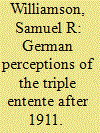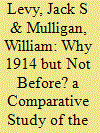|
|
|
Sort Order |
|
|
|
Items / Page
|
|
|
|
|
|
|
| Srl | Item |
| 1 |
ID:
103943


|
|
|
|
|
| Publication |
2011.
|
| Summary/Abstract |
After 1911, Germany felt increasingly threatened by the Triple Entente. Secret intelligence from the Russian embassy in London revealed a growing cohesion among the Triple Entente partners: Britain, Russia, and France. In particular, Berlin feared the success of Raymond Poincaré of France, first as premier and then later as President, as he worked to convert the entente with London into an alliance and to reinforce alliance ties with Russia. In the summer of 1914 came the murders at Sarajevo of Habsburg Archduke Franz Ferdinand and his wife. When Vienna decided to punish Serbia, Berlin agreed to support them in the belief that Russia would not back Serbia. But even if Russia did support Serbia, better a war now than later. Rather than be intimidated, Russia took escalatory actions of its own to help Serbia and their French ally. The First World War was the result.
|
|
|
|
|
|
|
|
|
|
|
|
|
|
|
|
| 2 |
ID:
188632


|
|
|
|
|
| Summary/Abstract |
This study examines whether “invasion scares” before 1914 period had an impact on the course of British strategy. It shows that contemporary observers perceived a clear link between the ways in which British society depicted and understood issues of strategy and the ways in which the state could prepare for and conduct a future war. This was particularly so when it came to the language used to describe issues of security in Britain and the ideological consensus that these discourses reflected. The prominent place of discussions about how to defend the British Isles against invasion before 1914 therefore convinced some observers that Briton’s preoccupation with passive defence was rendering the nation vulnerable by robbing it of the capacity to adopt credible policies of deterrence and offensive action.
|
|
|
|
|
|
|
|
|
|
|
|
|
|
|
|
| 3 |
ID:
183875


|
|
|
|
|
| Summary/Abstract |
Before 1914 scholars of international thought frequently relied on racist arguments, yet the ways that race was used varied widely from author to author. This article charts the way that race was used by two groups of Anglophone writers. The warriors used biological arguments to construct views of international affairs that relied on racist analysis. Pacifists might have used racist language that relied more on cultural prejudices, and would often base their more progressive views of international affairs on the idea of a civilizing mission. Using A. T. Mahan and Brooks Adams as exemplars of the warrior approach, and Norman Angell and H. N. Brailsford for the pacifists, I argue that race and racism play an important part in international thought before the First World War. This racism was directed at the colonized in the global South, Indigenous peoples in settler colonial states, and Jews in the global North. This use of race and racism in pre-First World War international thought has implications for how we view the development of International Relations today. It is not just statues and stately homes that require a thorough reassessment of attitudes to race, but also our understanding of the progression of ideas in international thought.
|
|
|
|
|
|
|
|
|
|
|
|
|
|
|
|
| 4 |
ID:
180456


|
|
|
|
|
| Summary/Abstract |
Why did the July 1914 crisis—but not crises in 1905, 1908–9, 1911, and 1912–13—escalate to great-power war despite occurring under similar international and domestic conditions? Explanations based on underlying and slowly changing structural, social, or cultural variables cannot answer this question. Examining three Balkan crises of 1912–13 and the July Crisis, we refine realist explanations based on power, alliances, and reputational interests by incorporating the impact of changing power distributions and alliances in the Balkans on the great-power security system. A more complete answer to the why-1914-but-not-before question, however, requires the incorporation of Franz Ferdinand’s assassination, which went beyond a pretext for war. It eliminated the most powerful and effective proponent for peace in Vienna and fundamentally changed the nature of the decision-making process in Austria-Hungary. Counterfactually, we argue that a hypothetical crisis with Franz Ferdinand present would probably have ended differently.
|
|
|
|
|
|
|
|
|
|
|
|
|
|
|
|
|
|
|
|
|